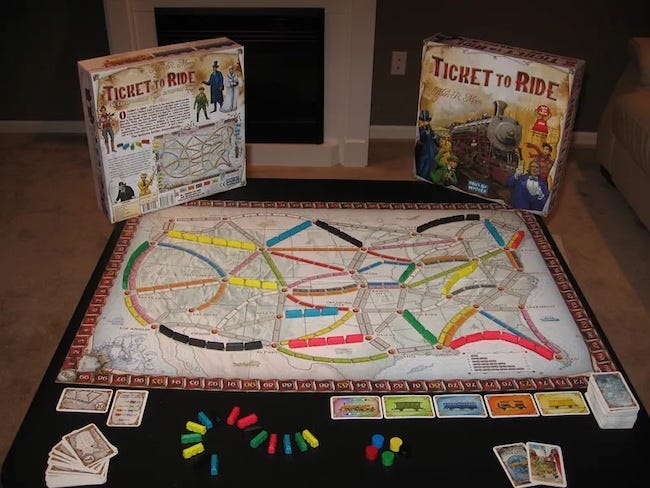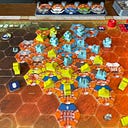Board Games Beyond Fun: How Play Can Supercharge Your Brain and Relationships
by H.C. Harrington

As an author with a penchant for world-building and fantasy, I’ve always appreciated the power of imagination and strategy. It’s no surprise that board games have found a special place in my heart. But let’s not be misled by the term “board games.” These are not just pieces of cardboard and plastic; they are gateways to another realm, a realm where imagination knows no bounds and where friendships are forged or tested.
Do you, too, cherish those memorable nights when you gather with friends or family around a table stacked with board games? I know I do. The thrill of rolling dice, the intrigue of outwitting opponents, and the camaraderie that emerges from shared triumphs and defeats make these moments truly special. But what if I told you there’s more to board games than meets the eye? What if I told you that these games, whether it’s a classic like Chess or a modern gem like Ticket to Ride, have the potential to supercharge your brain and strengthen your relationships?
In this article, I’ll embark on a journey into the mesmerizing world of board games. It’s a world that aligns with my love for world-building and fantasy, as I’ve discovered that these games are miniature universes where creativity and strategy are the keys to victory. But it’s also a world that connects with my fascination with cognition because playing board games is not just about passing time; it’s about enhancing our minds.
So, let’s roll the dice and begin our exploration of how board games can transform not only your game nights but also your mental faculties and your relationships. The adventure awaits, and I’m here to guide you through it. Ready to make your move?
1. Enhancing Critical Thinking
Remember those moments when you meticulously planned your next move in a board game, anticipating your opponent’s strategy? That’s where the magic of critical thinking unfolds. Board games, in their many forms, are designed to challenge your analytical and problem-solving skills.
When I delve into the depths of these games, I discover that they are essentially microcosms of complex narratives. Whether you’re building an empire in Settlers of Catan or deciphering the mysteries of the Lost Ruins of Arnak, you’re engaging your mind in a story where every decision has consequences.
The tactical nature of board games compels players to think several steps ahead, weighing the pros and cons of each move. It’s an exercise in logic and strategy, making it the perfect playground for developing critical thinking skills. As a writer, I find this aspect particularly fascinating because it’s akin to crafting a plot, where each twist and turn must make sense and contribute to the larger narrative.
From Chess, where every piece has a unique role, to resource management in games like Agricola, these games are cognitive workouts that prepare your mind for the challenges of both fiction and reality. They nurture the very skills that make me appreciate a well-constructed narrative and complex world-building.
In the realm of board games, each roll of the dice or card drawn represents an opportunity to hone your problem-solving abilities. And as you build your strategies, you’re not just competing; you’re engaging in a battle of wits and creativity.

2. Fostering Social Skills
Board games are not just about pieces and rules; they’re about people. Every time you sit down to play, you’re embarking on a social journey, and this is where my love for world-building comes into play. Just as I craft intricate universes in my fiction, board games create microcosms where relationships flourish, teamwork is essential, and diplomacy is often the key to success.
Take, for instance, the negotiations in a game of Settlers of Catan, where players must trade resources to prosper. Here, you learn the art of negotiation and compromise. The ability to persuade, strike deals, and form alliances becomes paramount. It’s a dynamic I’ve come to appreciate as it mirrors the intricate web of alliances and conflicts I construct in my fantasy worlds.
Whether you’re cooperating in Pandemic to save the world from diseases or competing in a game of Voidfall, you’re engaging in social dynamics that teach cooperation and competition. In this sense, board games are not only enjoyable but also educational, especially for those who, like me, are passionate about how societies function and evolve.
The beauty of these games is that they bring people together. They spark conversations and laughter, they test friendships, and they reinforce the idea that it’s not just about winning but about the experiences shared.
I find the board game table to be a place where emotions run high, alliances are formed and broken, and every move can change the course of the narrative. It’s a world I encourage you to explore because it’s more than just play; it’s an opportunity to build relationships and understand the human dynamics that shape our real and fictional worlds.

3. Educational Applications
If you’re anything like me, the quest for knowledge is a never-ending journey. The world of board games has not only been a source of entertainment but also a wellspring of learning, and this is where my love for education and world-building collide. Board games offer a fascinating bridge between play and knowledge acquisition.
In classrooms and homes, board games are increasingly recognized as tools for education. These games have the power to turn learning into an immersive and enjoyable experience. Consider games like Scrabble or Bananagrams, where wordplay and vocabulary expansion are intertwined with fun. It’s as if we’re crafting the language of our worlds with every word we create.
But it doesn’t stop with language. Mathematics comes to life in games like Power Grid as players calculate routes and scores. Historical knowledge is unearthed in games such as 7 Wonders, where each civilization reflects a different era of our shared history. I find this fusion of fun and learning absolutely captivating.
Educators and parents have realized that board games are not just a diversion but a gateway to discovery. They enhance cognitive abilities, teach problem-solving, and offer practical insights into various subjects. It’s a bridge between the magic of fiction and the realities of the world we live in.
For me, it’s akin to crafting the rich tapestry of a fictional world, except this time, the world is real, and the players are the authors of their own narratives. So, whether you’re a teacher looking for engaging ways to impart knowledge or a learner eager to explore new horizons, board games offer an exciting path toward enlightenment.
If you’ve enjoyed this exploration of board games and their profound impact, I invite you to join me in a quest to support indie content creators who are crafting unique, written experiences in the realm of board games. In an age dominated by screens and fast-paced entertainment, there’s a quiet revolution happening within the pages of articles, blogs, and written reviews.
Here’s how you can help:
- Follow: Click that “Follow” button on their blogs and social media profiles. Your support can ensure you never miss a single insightful article.
- Engage: Leave a comment, share your thoughts, and spark conversations. Your insights are invaluable in creating a vibrant community of board game enthusiasts.
By taking these simple actions, you’re helping to champion the written word in board gaming and empower creators who pour their hearts into every piece they craft. Together, we can ensure that the legacy of board games, along with the rich stories they hold, continues to thrive. As an author who appreciates the power of storytelling and the dedication of fellow creators, I thank you for embarking on this journey with us.
-BoardGameNerd
